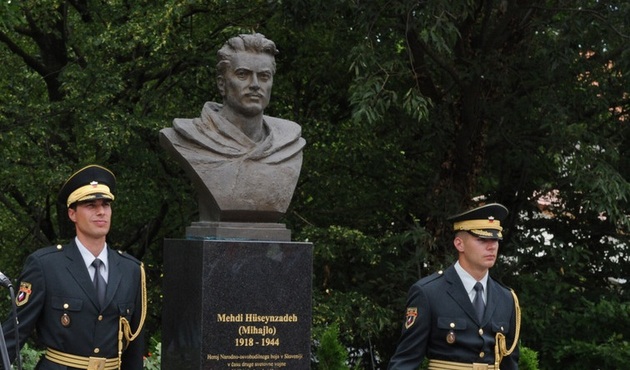What does it mean to be a hero? Be decisive in action, overcome any circumstances, triumph over fear, defeat any enemy? For sure. But love also lives in the hearts of real heroes. Love for your people, for the Motherland. With this article, we open a series of stories about the heroes of the Caucasus - people who showed an image of true love and devotion to their fatherland.
“Mikhailo, your one day in a partisan detachment is equal to ten days of the Red Army,” Colonel Rybachenko said to the partisan Mekhti Huseynzade, known throughout the Adriatic coast. "I suppose," Stanko Petelinovoyko, the former chief of staff of the 31st division of the 9th partisan corps of the People's Liberation Army of Yugoslavia, writes in a book of memoirs published in Ljubljana, "the total result of Mehdi Huseynzade's actions was about a thousand killed fascists, mainly officers." He was like fire - fast, agile, brave, able to find a way out of any situation. He gave close people a kind fire of the soul, but he burned the fascists who brought death in the hellish flame of explosions, which he arranged, as if playfully. On combat missions, Mehdi usually went alone, being able to skillfully transform into a local peasant, or into a drunken German soldier, or an officer. He was elusive, and the Nazis trembled at the very mention of his name.
In the Balkan grouping of Wehrmacht troops, Mehti Huseynzade was called "Dagger" for his swiftness, accuracy and mortal danger. Convinced of the impossibility of catching the partisan on their own, the Nazis distributed leaflets in all settlements, in which they indicated the price for the head of Mehdi, which increased as the damage caused to the Nazis increased. 40 thousand lire was promised after the explosion of a restaurant for German soldiers, where about 300 fascists were killed. After that, Mekhti sends into the air the lair of fascist propaganda - the editorial office and printing house of the newspaper, where they published ads about the wanted partisan Mekhti, known as Mikhailo. Soon, the price for the elusive guerrilla rose to a fantastic 400,000 lire. By this time, he had a particularly important object on his account - the group's command garage with 25 military vehicles.
Leaving for the front, Mekhti wrote to his elder sister: "Yesterday I was given a machine gun and a new military uniform. I wonder if I, Mekhti, can kill a person from this machine. After all, I could never accept the death of a single living creature. I received such education." ...
Indeed, the Caucasian upbringing, especially sensitive to the concepts of life and death, honor and dignity, made Mehdi a real hero. A year later, Mekhti's last letter arrived from Stalingrad with a completely opposite content. "I am writing from the front. There are hot battles. There is no limit to the outrages committed by the Nazis. I give you my word that I will fight to the last drop of my blood. I will fight heroically and glorify you. If I die, I will die a hero. You will hear about me again." To live to defeat the enemy, to defend his homeland, to avenge the ruined lives of thousands of people, for his shattered dreams - that was the goal of Mehdi until the end of his life. A poet, artist, artist who skillfully knew how to reincarnate, all the talents of Mehdi cannot be enumerated. And life called him to the heroism that made his name legendary.
A monument has been erected in Baku that perpetuates the image of a 26-year-old guy, who during his lifetime became famous as the legendary partisan Mikhailo, and after his death, the rarest, and perhaps the only case, as a hero of three peoples - Italy, Yugoslavia and the Soviet Union. Mekhti fulfilled his promise to his sister and glorified the name of the Azerbaijani people, who inscribed the names of the victors over fascism.






